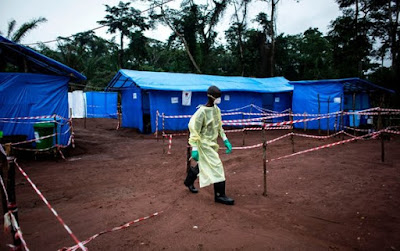 |
| A health worker walks at an Ebola quarantine unit on June 13, 2017 in Muma, Congo. Credit: John Wessels Getty Images |
Topics: Biology, Ebola, Existentialism, Politics
The fact that the erstwhile resident of 1600 Pennsylvania Avenue, conman, racist, thug and crook has labeled any countries with shades of Melanin darker than his orange hue as "s-hole countries," don't expect any help from the US anytime soon. As a matter-of-fact, I expect we'll look at Puerto Rico as halcyon days of functionality.
The new Ebola outbreak on the western edge of the Democratic Republic of the Congo has ignited serious concern at the World Health Organization, with signs pointing to an epidemic that may have been underway for weeks or months.
Though there are only two confirmed cases at this point, preliminary investigations point to cases in several locations that may date back as far as early this year, Dr. Pierre Formenty, the WHO’s top Ebola expert told STAT. There is also fear that two health care workers may be among the infected, which happens often in Ebola outbreaks and can fuel the disease’s spread.
The country’s ministry of health, which declared the outbreak on Tuesday, said then that there are at least 21 people known to have symptoms consistent with Ebola, and 17 of whom have died.
While the outbreak is in a remote area where road travel is taxing and slow, one of the towns where cases may be occurring, Bikoro, is a port on a lake that connects to the Congo River. That opens up the disturbing specter of infected individuals traveling by boat to DRC’s densely populated capital, Kinshasa, or to Brazzaville, the capital of the neighboring Republic of the Congo.
“If it was only the roads, we know that the roads are very bad and that it’s difficult for people to travel. But if you reach Bikoro and you take a boat … everything could happen,” Formenty said in an interview on Wednesday.
“For us it’s a worrying situation in a bad context in terms of logistics. And we need to go fast.”
WHO Officials Fear Latest Ebola Outbreak in Congo Could Spread to Big Cities Helen Branswell, Scientific American
Comments